Category: Ludwig Boltzmann
-
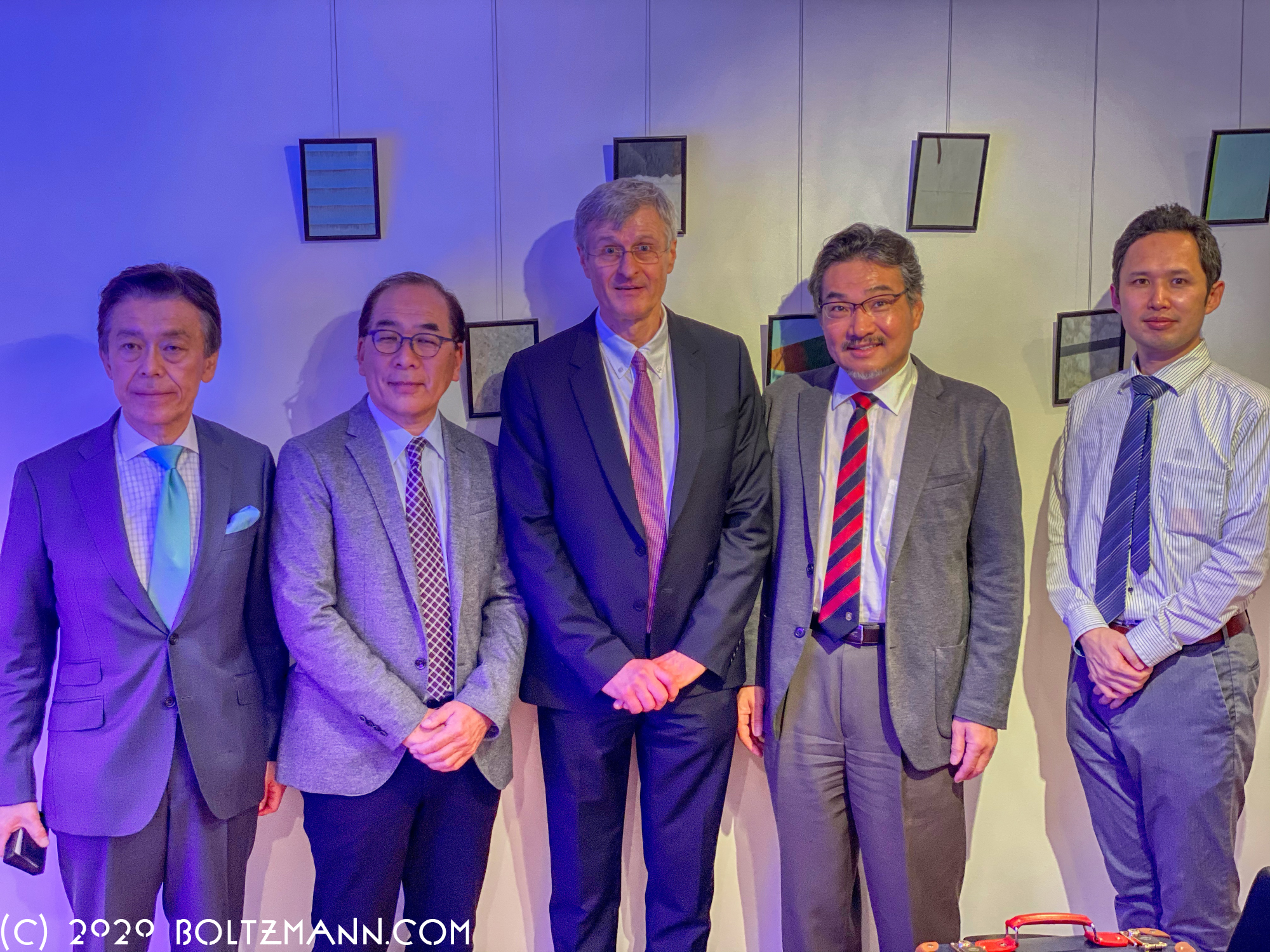
12th Ludwig Boltzmann Forum Tokyo 2020
Energy. Entropy. Leadership. 12th Ludwig Boltzmann Forum, 20 February 2020 at the Embassy of Austria, Tokyo. Gerhard Fasol, Chair and Producer. Program Welcome by the Ambassador of Austria, Hubert Heiss. Gerhard Fasol, CEO and Founder, Eurotechnology Japan KK, Guest-Professor Kyushu University, former faculty Cambridge University and Tokyo University, Past-Fellow Trinity College Cambridge “Today’s agenda. Entropy,…
-
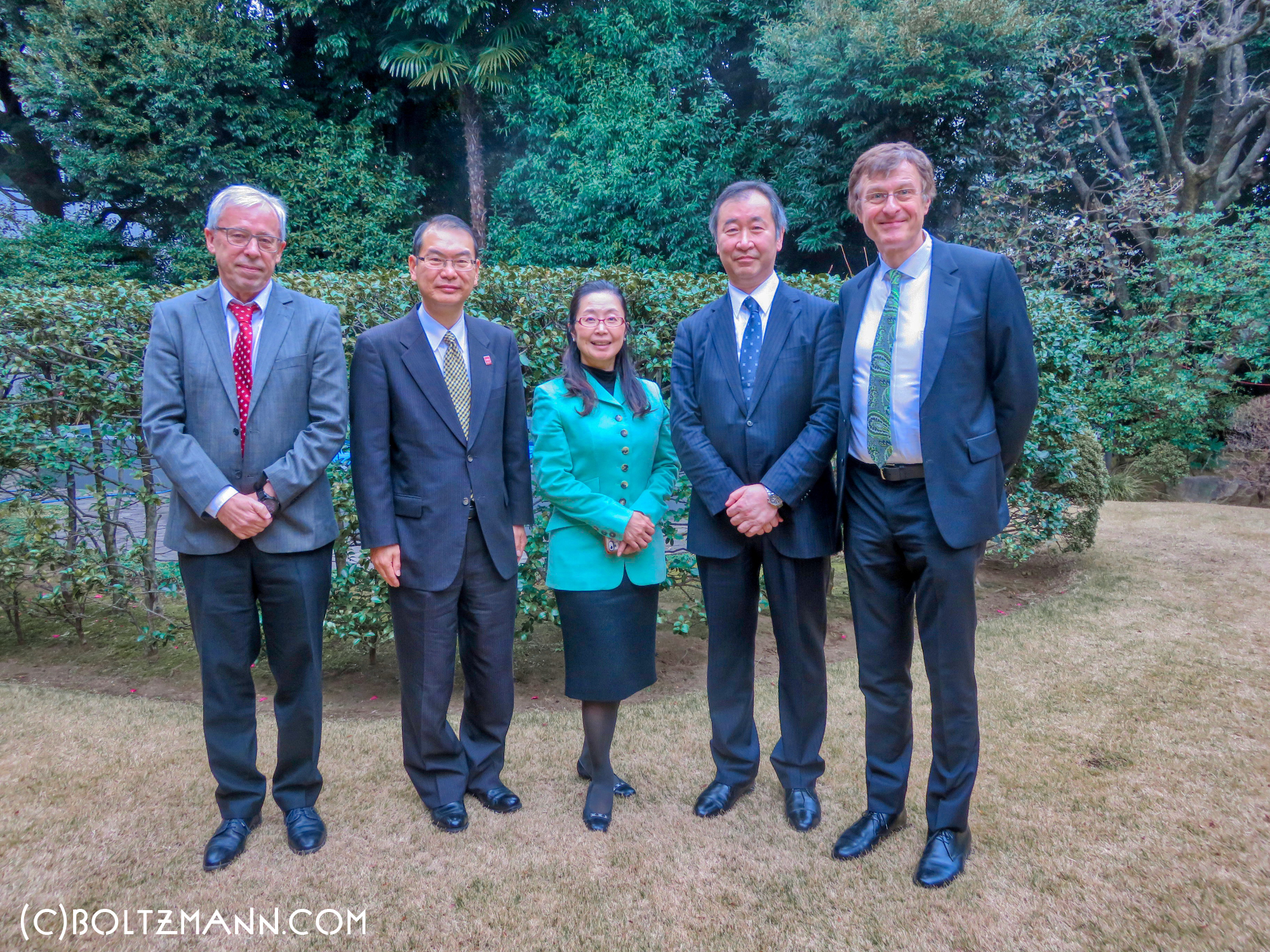
11th Ludwig Boltzmann Forum Tokyo 2019
Energy. Entropy. Leadership. 11th Ludwig Boltzmann Forum, 20 February 2019 at the Embassy of Austria, Tokyo. Gerhard Fasol, Chair Program Welcome by the Ambassador of Austria, Hubert Heiss. Gerhard Fasol, CEO and Founder Eurotechnology Japan K, Guest-Professor Kyushu University, former faculty Cambridge University and Tokyo University, Past-Fellow Trinity College Cambridge “Today’s agenda. Entropy, information and…
-
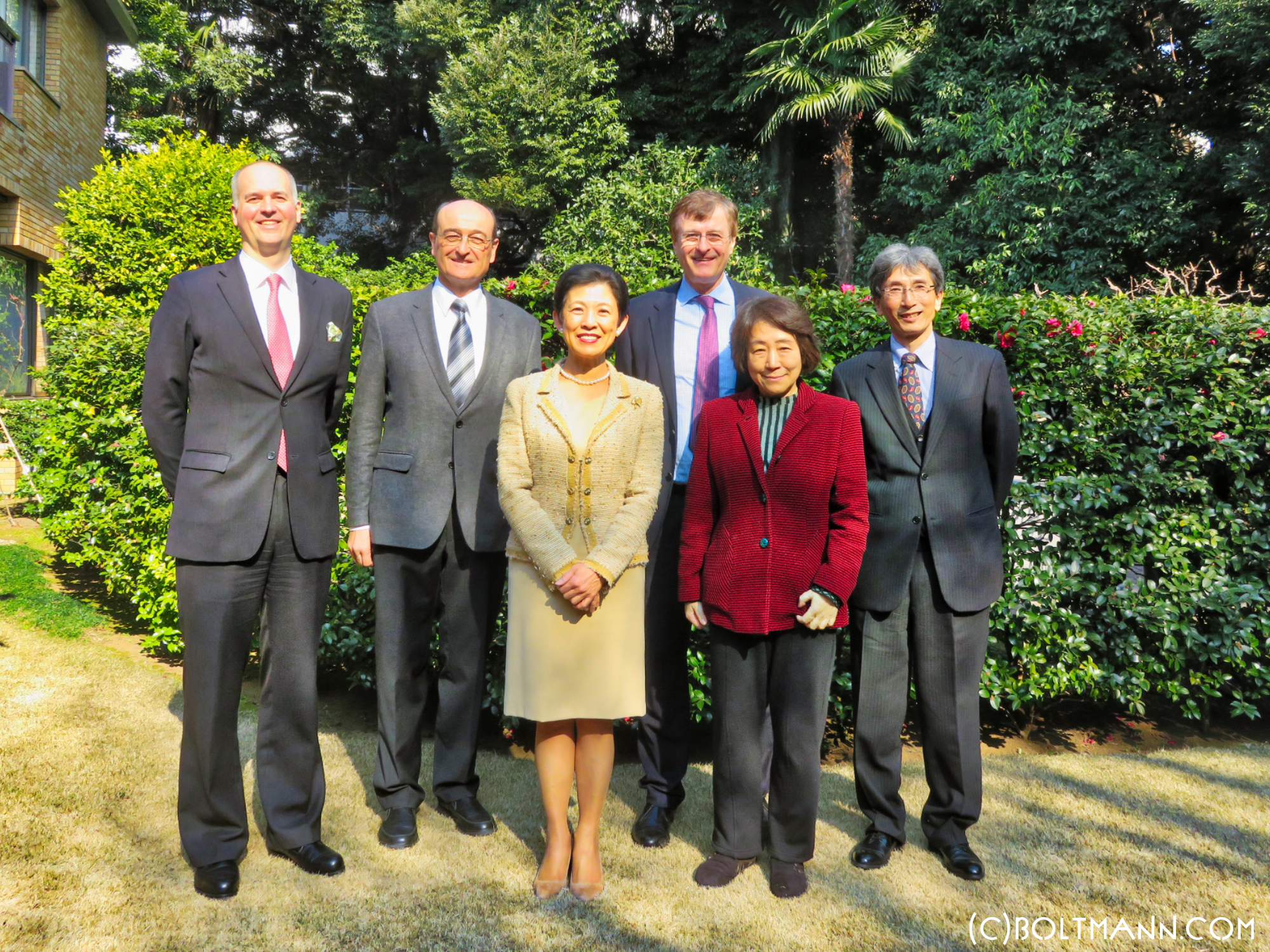
10th Ludwig Boltzmann Forum Tokyo 2018
Energy. Entropy. Leadership. 10th Ludwig Boltzmann Forum, 20 February 2018 at the Embassy of Austria in Tokyo Gerhard Fasol, Chair Program Welcome by the Ambassador of Austria, represented by Magister Konstantin Saupe (Embassy of Austria) Gerhard Fasol CEO Eurotechnology Japan KK, Board Director GMO Cloud KK, Guest-Professor Kyushu University, former faculty Cambridge University and Tokyo…
-
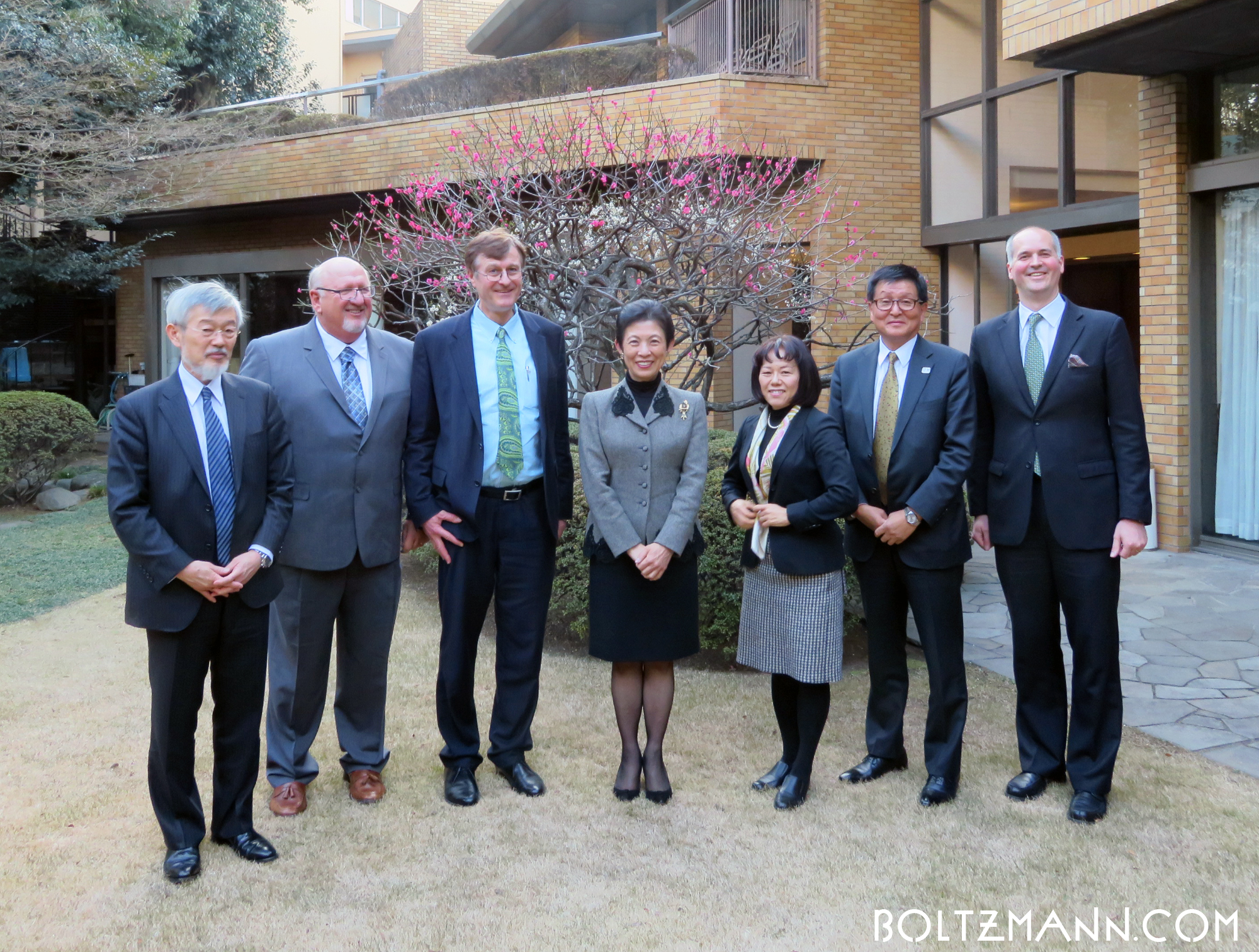
9th Ludwig Boltzmann Forum Tokyo 2017
Energy. Entropy. Leadership. 9th Ludwig Boltzmann Forum, 16 February 2017, at the Embassy of Austria in Tokyo Gerhard Fasol, Chair Program Welcome by the Ambassador of Austria Gerhard Fasol CEO, Eurotechnology Japan KK, Board Director, GMO Cloud KK. former faculty Cambridge University and past Fellow, Trinity College Cambridge“Entropy, information and Ludwig Boltzmann” Masato Wakayama Executive…
-
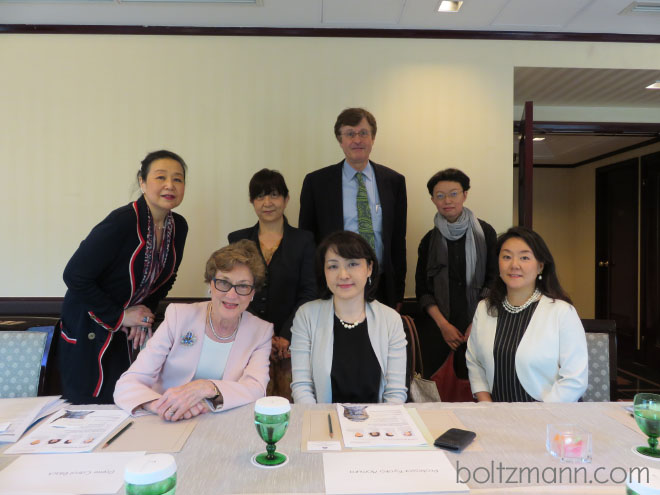
Ludwig Boltzmann Forum on Women’s development and leadership 2016
Women’s development and leadership Tokyo, Monday 16 May 2016, 9:00-11:00am Gerhard Fasol, Chair Program 9:00-9:20 Gerhard Fasol CEO, Eurotechnology Japan KK, Board Director, GMO Cloud KK. former faculty Cambridge University, and Trinity College, and Tokyo University Objectives of the Ludwig Boltzmann Forum on Women’s development and leadership 9:20-9:40 Dame Carol Black DBE FRCP FMedSci is…
-
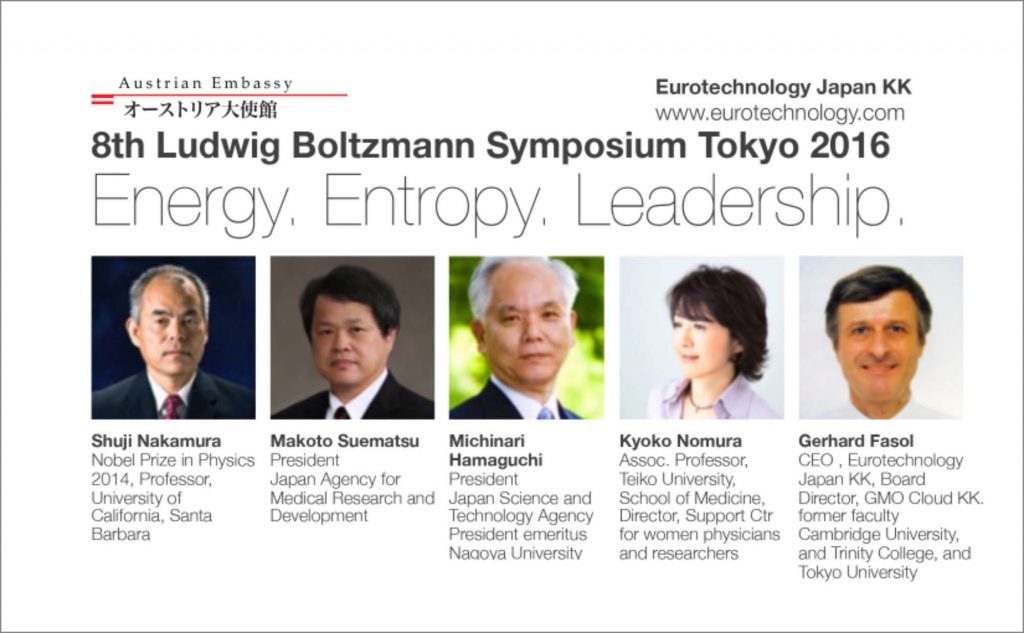
8th Ludwig Boltzmann Forum Tokyo 2016
Energy. Entropy. Leadership. 8th Ludwig Boltzmann Forum – Thursday 18 February 2016, Embassy of Austria in Tokyo Program 14:00-14:10 Dr. Bernhard Zimburg (Ambassador of Austria to Japan) Welcome address 14:10-14:30 Gerhard Fasol (CEO , Eurotechnology Japan KK, Board Director, GMO Cloud KK. former faculty Cambridge University and past Fellow, Trinity College Cambridge) Ludwig Boltzmann 14:30-15:30…
-
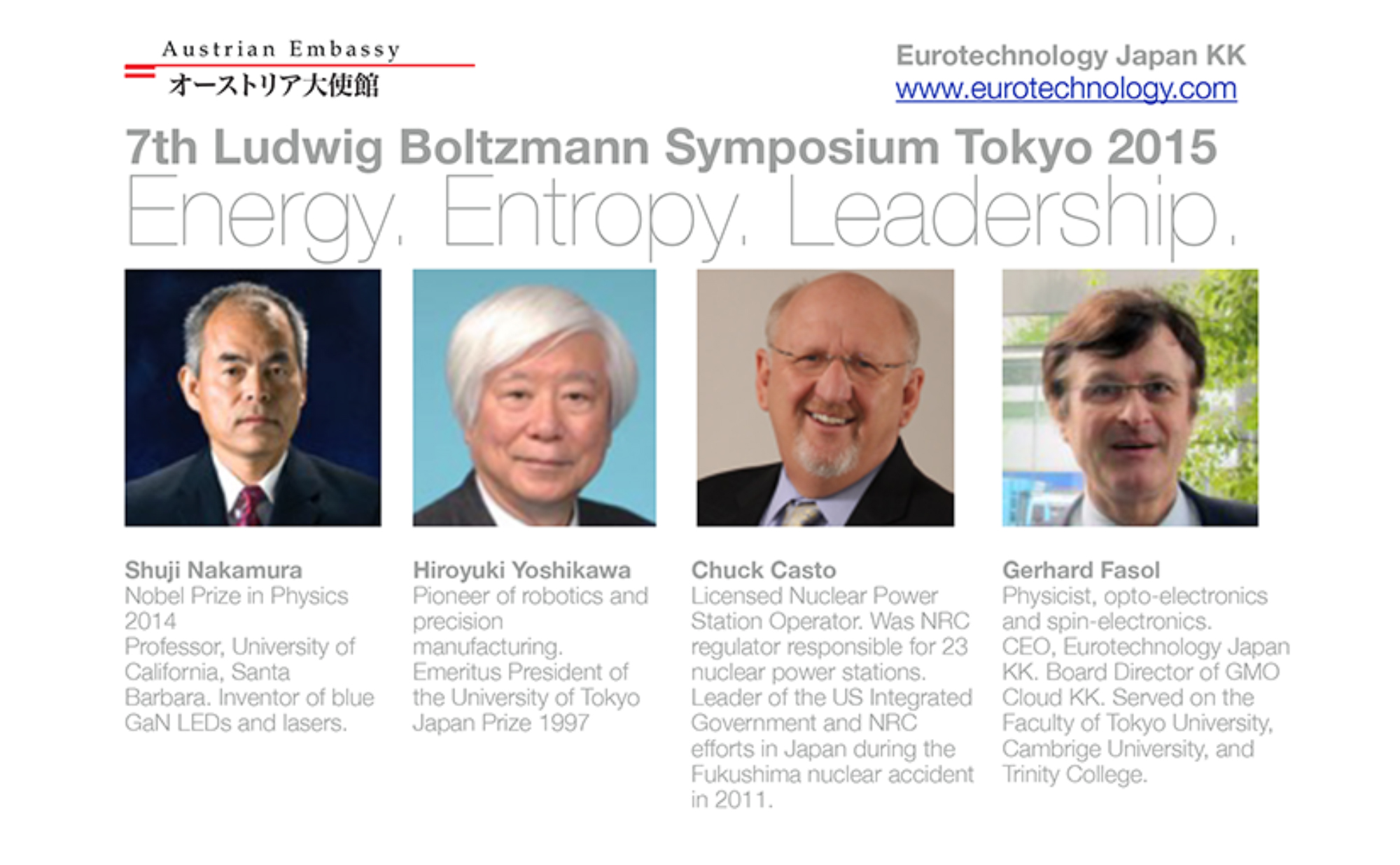
7th Ludwig Boltzmann Forum Tokyo 2015
7th Ludwig Boltzmann Forum: 20 February 2015 at the Embassy of Austria in Tokyo Gerhard Fasol, Chair One highlight of this year’s 7th Ludwig Boltzmann Forum was when Nobel Prize Winner Shuji Nakamura who’s invention of GaN LEDs eliminates the need to build thirty 1GW class nuclear power stations in the USA alone by 2030,…
-
5th Ludwig Boltzmann Symposium Tokyo 2013
“ENERGY” Wednesday, 20th February 2013, Embassy of Austria, Tokyo 14:00 Welcome by Dr. Bernhard Zimburg, Ambassador of Austria to Japan 14:10 Gerhard Fasol, “today’s agenda” 14:20 – 14:40 Robert Geller Professor of Geophysics University of Tokyo, seismologist. First ever tenured non-Japanese faculty member at the University of Tokyo “A seismologist looks at nuclear power plant…
-
4th Ludwig Boltzmann Symposium Tokyo 2012
“ENERGY” on Monday, 20th February 2012 14:00 Welcome by Thomas Loidl, Chargé d’affaires ad interim of the Austrian Embassy 14:10 Gerhard Fasol: today’s agenda” 14:20 – 14:40 Tatsuo Masuda Professor at Nagoya University of Commerce and Business, served as Director of Oil Markets and Emergency Preparedness of IEA “New energy architecture for Japan” 14:40 –…
-
3rd Ludwig Boltzmann Symposium Tokyo 2011
Topic “Space and Energy and Ludwig Boltzmann” on Thursday, 17th February 2011, Embassy of Austria, Tokyo. 14:00 Welcome by Michael Haider, Cultural Counsellor of the Austrian Embassy 14:10 – 14:40 Gerhard Fasol, “Ludwig Boltzmann: Pioneer of understanding Space and Energy” 15:00 – 15:45 Tetsuhiko Ikegami, PhD Chairman, Space Activities Commission, Ministry of Education, Culture, Sports,…
